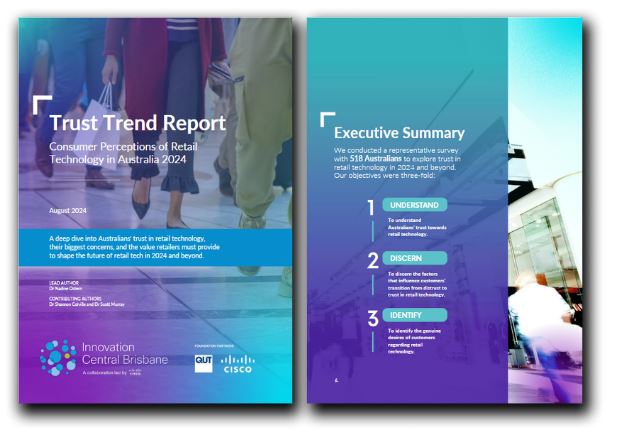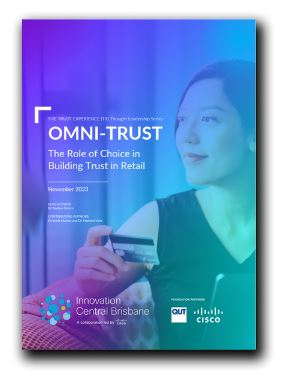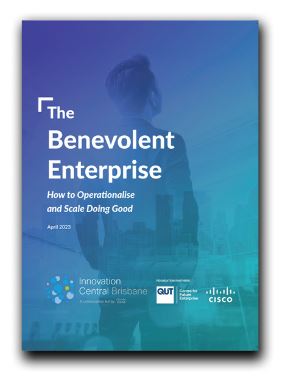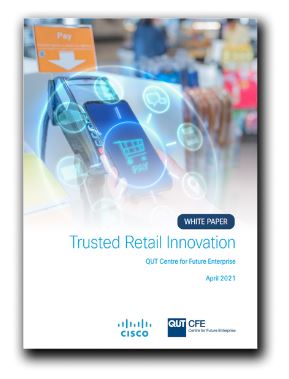QUT’s TRUST EXPERIENCE (TX) Thought Leadership Series
Why Retailers are still Lagging Behind Customers’ ‘Techspectations’
The latest report in the Trust Experience (TX) series, Trust Trend Report: Consumer Perceptions of Retail Technology in Australia 2024, finds value propositions can alleviate trust concerns and bridge the technology gap.
A comprehensive survey conducted with 518 Australians reveals intriguing insights into consumers’ perceptions and trust of retail technology in 2024. The research, aimed at understanding the trust dynamics and adoption barriers within the retail sector, provides critical data points for retail, business, and industry stakeholders.
“Understanding customers’ concerns and the current state of trust in retail technology is crucial. The Australian Trust Trend Report 2024 delivers precisely this insight.”
Mark Scanlan | Global Industry Lead for Retail, Cisco Systems
Download the Trust Trend report
Trust and adoption of retail technology
Researchers at QUT, led by Dr Nadine Ostern, Cisco Chair in Trusted Retail, have found that while Australians exhibit a general trust in retail technology, they remain hesitant to adopt new advancements swiftly. The findings suggest that trust issues revolving around technical and social aspects are significant barriers. However, these concerns can be mitigated through clear value propositions.
“The year 2024 has been named the ‘Year of AI’, marking a significant shift for individuals, organizations, and society as a whole. What was once considered futuristic is now becoming a reality. People are moving from merely being curious about sophisticated technologies, such as generative AI, to integrating them into their everyday lives,” commented Dr Ostern. “But when offered by organizations, especially retailers, this openness often comes to a halt. For retailers, digital transformation and technology adoption, which includes more than just AI, isn’t just about their own growth, it’s about effectively transitioning their customers to trusting the new tech. Retailers must understand both the intended and unintended consequences of tech usage to address customers’ trust concerns effectively.”
Understanding these insights is crucial for retailers and industry stakeholders aiming to thrive in the evolving retail landscape. The latest research findings offer a roadmap to navigating the complexities of technology integration in retail with the survey unveiling several pivotal insights:
- Trusting but hesitant: Australians trust new technologies but are slow to adopt them. While 78.8% of people generally consider themselves trusting, only 39.6% are open to adopting new technologies. Trust concerns about technical and social aspects, such as privacy and data security, hinder widespread acceptance.
- Value proposition is key: Clear and compelling value propositions can alleviate many of the trust issues. When consumers understand the tangible benefits of new technology, they are more inclined to adopt it.
- Transparency matters: Addressing privacy concerns through transparency is essential. Consumers want to know how their data is used and what benefits they will receive in return. While these concerns are well understood, the survey found that loss of human interaction is among the three biggest trust concerns. Dr Ostern notes, “It’s interesting to see this tension where customers are both excited about AI and at the same time fear losing human connection. It will be important for retailers to strike the right balance when offering retail technology and automation to their customers.”
- Interest in automation: There is a notable openness among Australians towards fully automated stores and self-driving vehicles. This indicates a growing interest in automating and streamlining shopping processes.
- The future is shaped by AI: The appetite for convenience and efficiency among Australians suggests a promising future for AI-driven retail innovations.
The findings underscore not only the potential for advancing retail technology rapidly, but the criticality of addressing both technical and social concerns to foster greater consumer trust and adoption of retail technology. Dr Nadine Ostern adds, “We found retailers often struggle to communicate the benefits of retail technology to their customers. Take AI cameras above self-checkout stations, for example. While they help prevent theft, customers may feel unfairly mistrusted. However, these cameras could also be used to ensure customers don’t overpay, which would build trust. Unfortunately, current systems aren’t designed for this, and as a result, the focus on security and data breaches often overshadows the potential customer benefits. This missed opportunity leads customers to conclude retail technology is often only benefitting the retailer. This lack of customer-focused innovation can hurt retailers in the long run.”
“Retailers who succeed in building trust will be those who effectively communicate the tangible benefits of their technologies and simplify the customer experience,” said Dr Ostern. “By focusing on these areas, retailers can foster greater acceptance and enthusiasm for technological advancements… and transform customers’ scepticism surrounding retail technology into a real trust opportunity.”
Watch now
| This short conversation between Dr Nadine Ostern and Graeme Hughes, one of Australia’s leading experts on business, consumer behaviour and the economy, highlights why and how retailers need to prioritise consumer trust, and why the new Trust Trend report can give them a head start in understanding current customer concerns. |  |
| This short conversation between Dr Nadine Ostern and Terry Weber, Cisco Regional Manager (QLD, NT & PNG), underscores the importance of understanding consumers’ trust concerns, especially as new retail technologies are pushing many customers out of their comfort zones. | 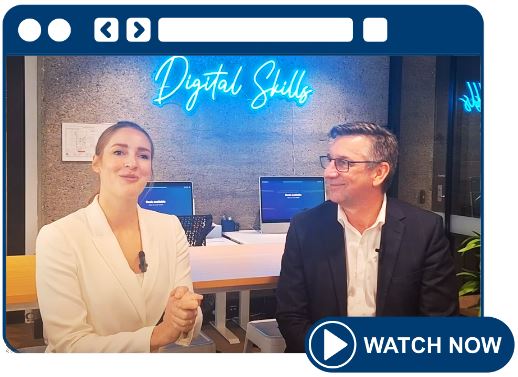 |

Download previous whitepapers in the Trust Experience (TX) series
| Omni-Trust: The Role of Choice in Building Trust in Retail
|
The Benevolent Enterprise: How to Operationalise and Scale Doing Good
|
Trusted Retail Innovation: What is Trust and Why Does it Matter?
|
Find out more about the Trust Experience (TX)

